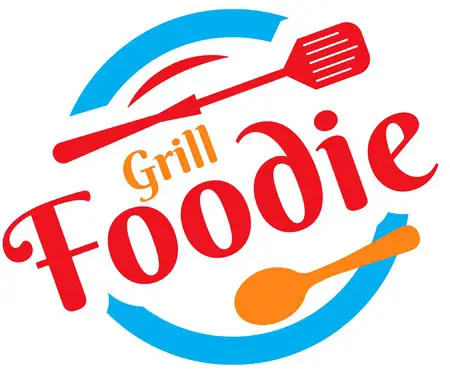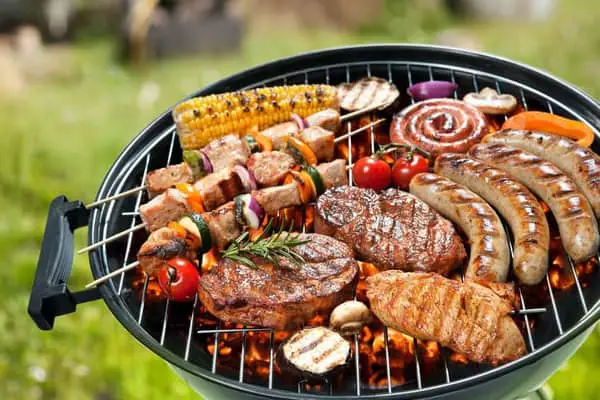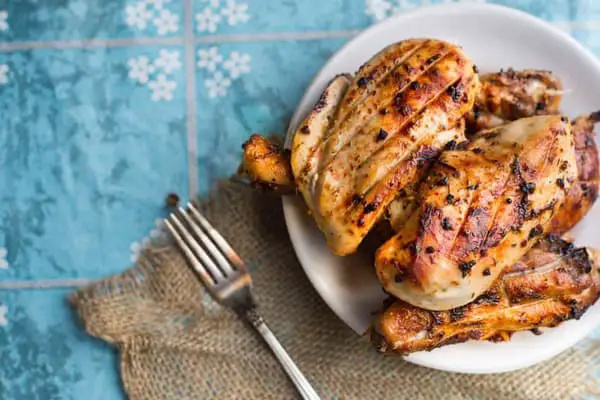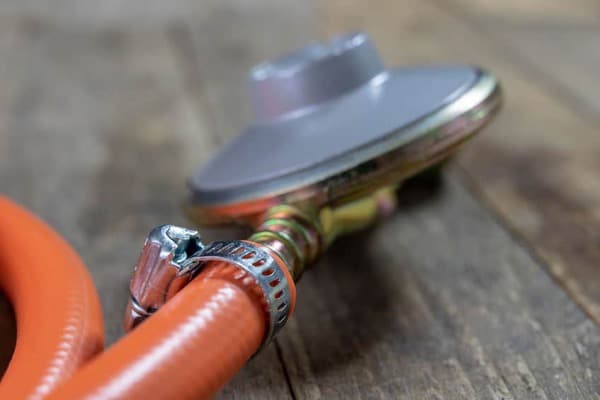
Lots of people prefer to use natural gas line because it is reliable, abundant and cheaper compared to propane gas. When you install a natural gas line, you will no longer have to worry about running out of gas in the middle of the night when preparing your favorite meal. But what happens if you relocate to another place and you don’t have access to the natural gas line? Does it mean that you have to buy a propane gas grill?
Can I use propane on the natural gas grill?
If you have recently moved to a different location where there is no access to a natural gas line or want to carry your natural gas grill for camping or picnic, you must be wondering whether it is possible to use propane on your natural gas grill.
The answer is YES, you can use propane on your natural gas grill. However, you can only use propane on your natural gas grill if the manufacture allows it and if you perform the conversion correctly. Remember that natural gas grill and propane gas are designed differently. For instance, the orifice jet for natural gas is considerably larger compared to that of a propane gas grill. This means that if you use propane on the natural gas grill without making any adjustment the flame will be too large which can lead to serious burn injuries which could lead to death. Therefore, it is important to first convert your natural gas grill using a recommended conversion kit before you start using propane.
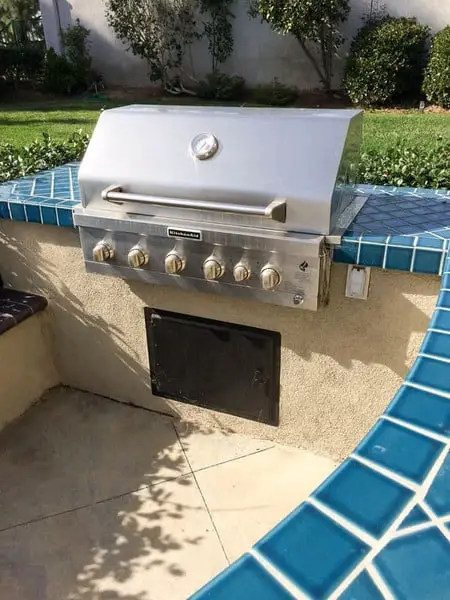
Step by step tips on how to convert natural gas grill to propane
To convert your natural gas grill to propane, you need three crucial components. They include an air shutter, a hose with LP regular, and smaller burner orifices. When converting your natural gas grill to a propane tank, you must ensure that both the volume and pressure are within the recommended levels for smooth and safe operation.
Step 1: Check if your grill supports conversion
Before you start the conversion process, check to know if the manufacturer allows conversion from natural gas to propane gas. This information is usually available in the user manual. If you have misplaced the user manual, then you should call the manufacture to find out whether they allow conversion. If your natural gas grill does not support conversion, then don’t even think about proceeding with the conversion process because you will damage the grill. You will also put your life and that of your loved ones at risk of getting burn injuries and even cause death.
Step 2: Ensure you have the right conversion kit
If your natural gas grill allows conversion, the next step is to ensure you have the right conversion kit. Most gas grill models usually come with their own conversion kits. If you don’t have one, you can contact the manufacturer to send you one at an additional fee.
Step 3: Remove the natural gas line
Once you have the appropriate conversion kit with you, the next step is shutting off the natural gas supply and then remove the cable that connects the gas line to the grill completely. Also removed any front or side panels on the grill to make it easy to access the barbeque section on the grill.
Step 4: Replace natural gas kit with a propane kit
Remove the regulator, gas valve and orifices installed in your natural gas grill then replace them with new parts that are compatible with propane. Make sure all barbeque fitting are well secured.
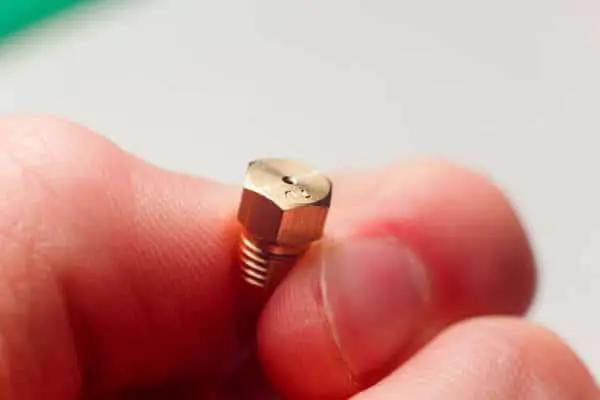
Step 5: Inspect the grill for loose connections and leaks
Once you have replaced the natural gas grill parts with propane compatible parts, the next crucial process is inspecting the connection to see if there are any leaks or loose connections. The best way to inspect for leaks is by carrying out a small soap bubble test.
Prepare a small water soap solution then turn on the connection. Pour a small amount of the solution on the connection and if you spot bubbles then that is an indication that the newly installed part is not airtight. If that is the case, turn the gas supply off and tighten the parts once again. Repeat the same process until the connection is airtight.
Step 6: Turn on the gas supply
Once you fix all loose connections and leaks turn on the gas supply to start using the grill with a propane tank. That’s it.
Reasons to convert your natural gas grill to propane
Convenience
One of the top reasons why people convert natural gas grills to propane is because of convenience. Unlike a natural gas grill that is not portable a gas grill that is powered by propane is portable, meaning you can use them in many places, including the backyard. You can also carry it for camping or hiking because of its portability. The convenience that propane gas grill gives is one of the top reasons why people switch from natural gas grills to propane tanks.
Relocation
Another reason why people choose to convert their natural gas grills to propane gas grills is because of relocation. When you move to a new place that has no access to a natural gas line, you may be forced to convert your grill to propane in order to continue using it.
More BTU output
Another reason why some people choose to use propane on a natural gas grill is that it delivers more BTU output. Chemically, there is a difference between propane and natural gas. Natural gas comprises mostly liquid methane and other gasses, including a small amount of propane. On the other hand, propane is refined meaning it requires less gas to produce the same BTU output as natural gas. As a result, propane gas tends to cook faster.
No upfront installation cost
Another common reason why people use propane on their natural gas grill is that propane does not require upfront installation cost. For instance, if you have just moved to a new home and you discover that installation of the natural gas line is very explosive and beyond your reach at the moment, you may decide to switch to propane which does not require upfront installation cost.
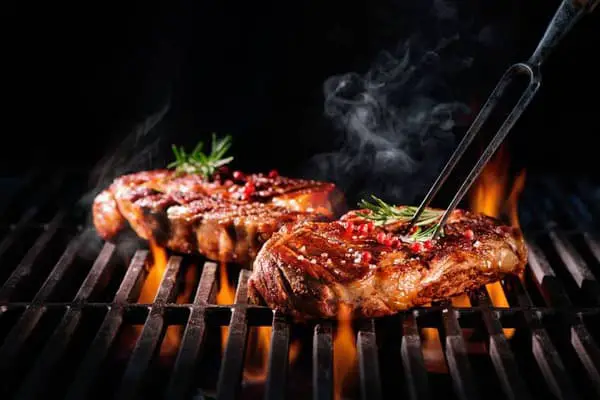
To save money
Another reason why people use propane on their natural gas grill is to save on cost. Gas grills are very expensive and buying two gas grills (natural gas grill and propane gas grill) is quite expensive for most people. There comes a time when you may want to use a propane tank like when having a BBQ in your backyard. Using propane on your natural gas grill will help save costs because it eliminates the need to buy a propane gas grill.
To save on space
Some people use propane on their natural gas grill because they have limited space. A natural gas grill is not mobile because they have to stay where the gas line is. Some people are usually forced to buy two gas grills, one that is powered by natural gas for everyday use and one that is powered by a propane tank for convenience and mobility. If you have limited space in your home, then buying two gas grills is not an option for you. In such as case, the best thing to do is to use propane on your natural gas grill.
Is it dangerous to use propane on a natural gas grill?
Using propane for a natural gas grill is not recommended unless you have to. This is because the natural gas grill is not designed for propane. For instance, Gas orifices of natural gas are usually bigger than propane orifices because propane gas has higher BTU. It is also more volatile and can cause serious injuries if used in a natural gas grill.
If you use propane in place of natural gas without using the right conversion kit, then you are putting yourself and those that you care about in danger. In fact, a vast majority of natural gas manufacturers don’t encourage customers to use propane in natural gas grills because they have not been designed to handle propane gas.
If the manufacturer has cautioned you against using propane gas in place of natural gas grill, then you should not attempt to do so even with a conversion kit because it won’t work. On the other hand, if your natural gas grill is compatible with a conversion kit, you should ensure you use a high-quality conversion kit that will ensure the grill runs smoothly and safely.
Will my natural gas grill get damaged if I use propane?
It depends on various factors, including the quality of the conversion kit used, the overall quality of your natural gas grill, including the quality of materials that crucial components are made of, and whether the manufacture allows the conversion from natural gas to propane. If the manufacturers allow the conversion of your natural gas grill to propane and you use high-quality conversion recommended, then your natural gas grill is less likely to get damaged. On the other hand, if you use a low-quality conversion kit or if you don’t install it correctly as required, then your natural gas grill will get damaged.
Remember natural gas grills are not designed to be used for propane. Therefore, if the correct installation process is not followed when converting your natural gas grill to propane, then it will damage vital components such as the heat plates, burners, and cooking grate, thus reducing the lifespan of your natural gas grill. To prevent this, make sure the manufacturer allows the use of both natural gas and propane. Also, use a high-quality conversion kit that is recommended by the manufacturer and install them correctly.
Benefits of converting your natural gas to propane
Whether the conversion of your natural gas grill to propane was brought about by a sudden relocation to a new area that has no access to a natural gas line or it was just a conscious decision, there are multiple benefits of converting your gas grill to propane.
First, refilling the propane task is relatively cheap and easy. Refilling the task will cost you about $20 and the tank may last for up six months, depending on usage. This means that running a propane-powered grill is relatively cheaper.
Although there is a possibility that the propane gas may run out while preparing your favorite meal, propane tanks are readily available and can be refilled within a few minutes. All you need to do is call the local LP gas dealer and they will sort you out as soon as possible. The point I’m driving is here is that propane tanks are readily available and easy to access.
Propane also delivers more BTU making it more efficient and reliable compared to natural gas. Propane tanks are also portable and will give you the flexibility to use your gas grill anywhere you want.
Final verdict
We hope the information provided has been informative and will help you make a wise decision. It is possible to use propane on your natural gas grill. However, this can only be possible if the manufacturer allows it. Please don’t use propane on your natural gas grill if the manufacture does not allow it. Additionally, natural gas grills are different from propane gas grills in many ways. So don’t plug the propane gas tube directly into your natural gas grill. You need to use the right conversion kit to prevent damaging the grill and causing serious injury to users. Follow the instruction given by the manufacturer when converting your natural gas grill to propane. Please don’t follow the instructions found on the internet. These procedures are dangerous and could lead to serious damage to your gas grill and/or serious burn injury.
